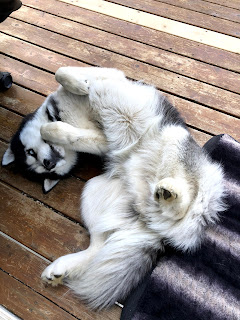This week's topic is one I feel oh so familiar with. When Life Gets In The Way: dealing with a schedule for writing when the world wants to go off the rails.
Over the decade (plus a year or two) since I decided to start writing again, I've nursed both my parents (for years) through Alzheimer's and Dementia, not to mention a whole host of other issues they faced, some of which, for my dad, happened during a pandemic. I've gone through their deaths now and the after-affects of their passing, all while raising a big family with active daughters (who have mostly finished college this year...ONE left!). I've also dealt with raising kids alone while my husband worked out of state or out of the country, along with enduring the struggles people face that we just don't show the world.
Through everything, I've stolen writing time when I could. Early in the mornings before work, in car rider lines, at gymnastics, dance, and cheerleading practices, while cooking dinner, sitting on hotel room balconies when we traveled, during flights, while waiting at the gate in airports, sitting in hospital rooms... I could go on. For so long, there was no such thing as a writing schedule. Writing had to happen in between the cracks of my life.
As KA said, routine is a luxury, one many writers do not have. It took forever for me to realize that routine was what I was striving for in those years. I was also striving for normal, longing for it, because I thought normal existed for some reason, and that if I planned well enough, I'd find it. I just wanted a day with no surprises. Small life hiccups I could deal with--being a mom teaches you how to do this with serious skill. It was the events that spun me in an entirely different direction that, of course, rattled me most.
I can't tell you how many times I've sat down and put my head in my hands, wanting to give up on writing because it felt like every time I hit any kind of writing stride or habit, something big happened to shake my world and flip the sense of 'normal' I might have wrangled for a time on its head. I'd have to drop everything to be a nurse, a psychologist, a medical sleuth, all to keep a parent alive and safe. Or maybe I was having to change out my writer hat to be Super Mom. I'll never pretend that I don't have a bit of trauma from living like that, the constant ups and downs and sideswipes. I'd get some momentum on a novel, then rise up only to have my legs kicked out from under me, some horrible happening sucking all the life out of me, and I'd have to be okay because other people depended on me.
There were times when I had to stop writing. There just wasn't enough energy for me to think creatively. Some breaks would span weeks, others months. At the time, I felt so guilty, and the writing world can even encourage that guilt, because, Hey! You're supposed to write daily! No matter what! Which just isn't feasible for everyone.
I try really hard to keep that kind of energy out of the universe, that writers should be able to push through difficult times and write anyway. I used to believe that, used to let it make me feel awful, but now I know better. Not everyone can write daily. It's totally okay to have to think about other things, to drop one ball because you simply cannot juggle them all. Sometimes, when life gets in the way, it gets in the way BIG, so big you can't see around it. Don't let someone else's idea of what you're supposed to do or not do become the definition by which you end up judging yourself. Give yourself grace in tough times. Take deep breaths and hot baths and long walks, or stay in bed all day and watch tv if that's what works to get you through. Drink warm tea and cold water or eat whatever the hell you want. Go outside and scream, curl up with someone you love, and cry. Whatever works. Writing will be there when you are able to return to it.
Now, my realist tendencies are going to come out. The problem with all of this is that once writing becomes a job, it's like any job. There are deadlines, expectations, and responsibilities. I have a trilogy coming out soon that was supposed to come out last fall. But, thankfully, I have a wonderful publisher who extended grace and gave me the time I needed to deal with my dad's passing and everything I've had to do to close his estate. Once we writers go under contract, it feels far less easy to just take a day off. Now, when a cataclysm shakes our foundation, it's harder to stay in hiding for the time we might truly need. Pages must be written and edited, newsletters sent, covers approved, and many other duties. My best advice for writers in that situation is to do whatever must be done to give yourself some time. It's okay to reach out to an agent or editor and let them know that your world has been turned upside down. Maybe they can help give you the breathing room you need.
Ultimately, we have to take care of ourselves or there will be no writing to worry about. Life still isn't "normal" for me, and I realize it never will be. No matter how well I might plan, life still happens. These days, I'm learning to trim away unnecessary tasks that eat up my time, to do better about staying ahead of publishing deadlines (which is hard!), to keep using lists and my KanBan board so that I have some sense of control over things, and to do a better job of nurturing myself. I love routine. I love structure. It's how I get things done. But, I also know that it can be interrupted at any moment. More importantly, I know that I've endured so much, and I'll survive regardless.
And I will always--always--come back to writing.
I hope you do, too.










































